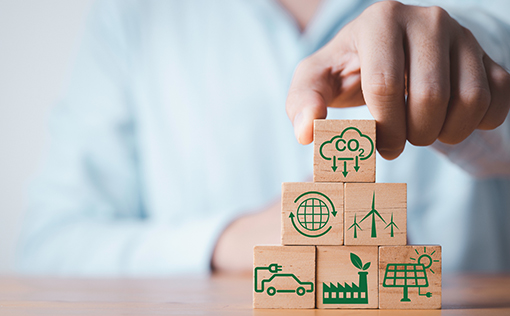
It was by chance, during a client’s move to Dakar, that Michel Giovannucci, director of AGS Senegal, met Willy Baey. The fellow Frenchman was delivering vegetables and dairy products to the same address. Willy’s produce not only looked delicious, it was also 100% organic, cultivated on his farm near the village of Bayakh.
An agricultural engineer-turned-farmer, Willy started Passion Nature Farm in 2002. Today he employs 20 staff, catering to local restaurants, hospitals, and expat customers. Over time, Willy has expanded his offering to include a variety of fruit, vegetables, salads, and aromatic herbs. And by combining organic farming with permaculture, he consistently delivers high-quality produce that is environmentally friendly.
Eager to make a significant impact on environmental protection, Michael recognised an opportunity when he unexpectedly crossed paths with Willy. Together, they developed a project that converts paper waste into soil. This concept not only reduces waste and lowers recycling costs but also transforms it into compost for cultivating food on Willy’s farm.
How does it work?
 Biowaste is biodegradable waste that consists of food scraps, branches, leaves, paper, and cardboard. It is produced by various community members, including residents, supermarkets, restaurants, and the food industry. Processing this organic waste generates humus that can be used to fertilise the soil.
Biowaste is biodegradable waste that consists of food scraps, branches, leaves, paper, and cardboard. It is produced by various community members, including residents, supermarkets, restaurants, and the food industry. Processing this organic waste generates humus that can be used to fertilise the soil.
As a member of the community, AGS produces waste when the paper packaging used to protect clients’ belongings during their moves reaches the end of its lifespan. Previously, it would have been recycled, but now the team removes any non-biodegradable plastics and tape before sending it to Willy’s farm for further processing.
There it is placed on the ground and watered. Over time, the packaging decomposes, releasing cellulose. When combined with manure or compost, it transforms into a high-quality biological soil. Converting biowaste into compost offers numerous benefits, including reducing chemical fertiliser usage.
Furthermore, any residual waste that cannot be converted into compost is used to power the oven of the local cement plant. This ensures that everything is recycled, aligning with a circular economy approach.
A commitment to green growth
 The project is an example of green growth, a term that describes economic growth that is environmentally sustainable. It is way to ensure that our natural assets continue to provide the resources on which our well-being depends. Or as Michel likes to say, “it is my contribution to the planet for my grandchildren”.
The project is an example of green growth, a term that describes economic growth that is environmentally sustainable. It is way to ensure that our natural assets continue to provide the resources on which our well-being depends. Or as Michel likes to say, “it is my contribution to the planet for my grandchildren”.
The AGS Senegal team fully supports the project and is eager to foster even more sustainable development within their community. As a result, despite Michel taking on new responsibilities for AGS in Tahiti, the project continues under the leadership of Loïc Delcon. The new director of AGS Senegal is also actively seeking other initiatives for the team to implement.
Whether it’s reducing fuel consumption, optimising routes to reduce truck travel time or using energy efficient LED light bulbs, every little bit helps. The team’s next goal is to establish a communal garden behind the AGS warehouse.
Join the movement and be part of the change today!
For more information on our initiatives and services be sure to visit AGS Movers.


